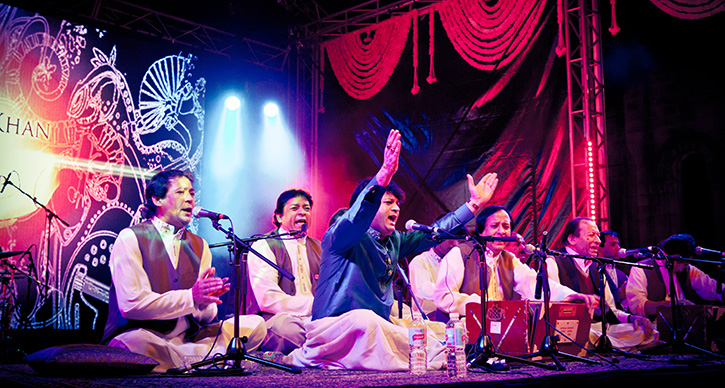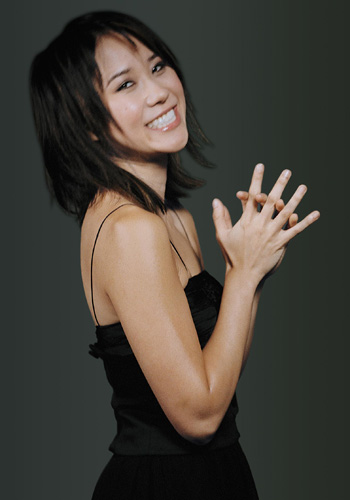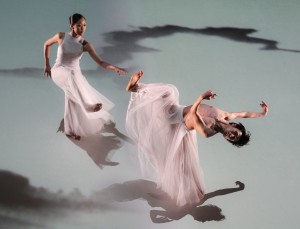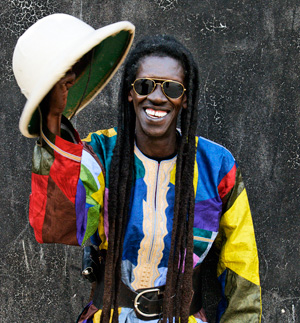Qawwali: More Familiar Than You Think
Photo: Asif Ali Khan Qawwali Music of Pakistan ensemble. They perform in Ann Arbor on March 21st, 2014. Photo by Cynthia Sciberras.
Qawwali is a kind of Sufi devotional music that is popular in South Asia, especially in parts of Pakistan and India. It has existed for at least 700 years. Although it is often referred to as a meditative and trance-inducing music, qawwali can be equally fast-paced and rapturous. The main themes of qawwali are love, devotion and longing for the Divine.
Listeners acquainted with North Indian classical music or the Whirling Dervishes of Turkey may hear something familiar. Although there are obvious differences, in many ways qawwali is comparable to North Indian classical music, Hindustani raga. India and Pakistan, as well as many other areas in South Asia share similar aspects of music due to shared history and similar instruments such as the harmonium and tabla. In both Hindustani classical music and qawwali, group performances are the norm; however, in qawwali, there is often a lead singer and a chorus that claps with the percussion during the pieces. In both kinds of music, one will usually hear each song progress through a slow introductory alap followed by a quicker development. Another similarity is the extensive vocal improvisation featured in both.
Concert duration will be another familiar feature where listeners can compare Hindustani classical music and qawwali music. Especially in contrast to music in the Western world, the length of time spent on each piece, as well as the concert’s total length will normally continue much longer than the duration expectations for usual concerts heard in the United States. Part of the reason for this length is that there are many different kinds of pieces that traditionally make up qawwali. Another reason is that the words are repeated with variations in order to bring out deeper meanings, as well as to lead the listener and performer into a trance, hal, which would then lead to spiritual enlightenment, fana.
Below are 5 different kinds of qawwali songs that you might hear with examples you might listen to.
1. A hamd is a song praising Allah. Traditionally, this is a piece used to begin a qawwali performance. An example is “Be Parwah de Naal Newn laa lia,” sung by Nusrat Fateh Ali Khan.
2. A naat is a song praising the Prophet Muhammad, which usually follows the opening hamd. Asif Ali Khan can be heard here singing “Madine ke Waali Madine Bulalo.”
3. The next song to be sung would be a manqabat, which either praises Imam Ali or one of the Sufi saints. For an example, listen to Rafiq Dildar sing “Ali Ali Maula.”
4. A genre of song sung less often is the marsiya which is a lamentation over the death Imam Husayn’s family during the Battle of Karbala. Below, you can listen to an example, “Hussain Hai,” sung by Nusrat Fateh Ali Khan.
5. One last major type of qawwali should be mentioned. A ghazal is a love song, and while the poetry’s meaning is spiritual, the lyrics often sound quite secular to an outsider. Many ghazals speak of the suffering of being separated from the one you love. Here is a recording of Abida Parveen, a female Pakistani vocalist, singing “Yaar Ko Hamne Ja Ba Ja Dekha.” It is important to note that in general, women do not sing qawwali, and even when the songs are sung, women sing in a different style than the men, as can be heard in this recording.
After listening to some of these pieces, it is impossible not to appreciate the entrancing quality of this music with its winding melodies and expansive qualities. Come listen to more on Friday, March 21st at 8 pm at Rackham Auditorium! The Asif Ali Khan Qawwali Music of Pakistan ensemble will be performing more beautiful, rousing music. While you’re there, see if you can pick out what kind of song is being sung!
Sources:
- Abbas, S. B. (2007). Risky knowledge in risky times: Political discourses of qawwali and sufiana-kalam in Pakistan-Indian Sufism.The Muslim World, 97(4), 626-639.
- Farida, Syeda. (2012). Whirling Dervishes, soulful qawwali. The Hindu.
- Huda, Q. (2007). Memory, performance, and poetic peacemaking in qawwali. The Muslim World, 97(4), 678-700.
- Kugle, S. (2007). Qawwali between written poem and sung lyric, or… how a ghazal lives. The Muslim World, 97(4), 571-610.
- Tanzeel, u. R. (2013, Sep 03). Qawwali: Sufi devotional music. The Financial Daily.
- Qureshi, R. B. (1981). Qawwali: Sound, context and meaning in Indo-Muslim Sufi music. (Order No. 8217377, University of Alberta (Canada)). ProQuest Dissertations and Theses, 513-513 p.
11/12 Asia & World Series
Asia
UMS focuses its global programming on four different regions of the world — the Arab World, Africa, the Americas, and Asia — with one region enjoying a particular focus during each season. Following the celebration of the performing arts of the Americas in the 10/11 season, UMS turns its thematic focus to Asia, specifically highlighting artists from China, Taiwan, Inner Mongolia, and India.
Subscription packages go on sale to the general public on Monday, May 9, and will be available through Friday, September 17. Current subscribers will receive renewal packets in early May and may renew their series upon receipt of the packet. Tickets to individual events will go on sale to the general public on Monday, August 22 (via www.ums.org) and Wednesday, August 24 (in person and by phone). Not sure if you’re on our mailing list? Click here to update your mailing address to be sure you’ll receive a brochure.
Yuja Wang, piano
Sunday, October 9, 4pm
Hill Auditorium
Twenty-four-year-old Chinese pianist Yuja Wang is widely recognized for playing that combines the spontaneity and fearless imagination of youth with the discipline and precision of a mature artist. She made her UMS debut in January 2008, just months after graduating from the Curtis Institute of Music, and since then has spent each year criss-crossing the globe with a cavalcade of impressive debuts and awards, including the prestigious Avery Fisher Career Grant, given to select musicians destined for bright solo careers.
Program
Ravel | Miroirs
Copland | Piano Variations
Rachmaninoff | Selected Preludes
Brahms | Sonata No. 1 or No. 3
Water Stains on the Wall
Cloud Gate Dance Theatre
Lin Hwai-min, artistic director
Friday, October 21, 8pm
Saturday, October 22, 8pm
Power Center
Trained in tai chi, meditation, Chinese opera movement, modern dance, and ballet, Cloud Gate Dance Theatre performs a rich repertoire with roots in Asian myths, folklore, and aesthetics, all infused with a contemporary perspective. For this long-awaited UMS debut, Cloud Gate presents Hwai-min’s newest work, Water Stains on the Wall. “Water stains on the wall” is a popular metaphor that represents the highest state in the aesthetics of Chinese calligraphy. Hwai-min and dancers take off from this metaphor and create and abstract work of beauty and magic that stands sublimely on its own.
AnDa Union from Inner Mongolia
Wednesday, November 9, 7:30pm
Michigan Theater
Formed in 2003, AnDa Union’s 14 members all hail from the Xilingol Grassland area of Inner Mongolia, a semi-autonomous region of China. AnDa Union are part of a musical movement that is finding inspiration in old and forgotten folk music from the nomadic herdsman cultures of Inner and Outer Mongolia, drawing on a repertoire of music that has all but disappeared during China’s recent tumultuous past. Its members are accomplished singers and instrumentalists, performing on the traditional horse-head fiddle (tsuur), the maodun chaoer, a three-holed flute, as well as Mongolian versions of the dulcimer, zither, lute, and mouth harp.
Beijing Guitar Duo with Manuel Barrueco
Sunday, November 20, 4 pm
Rackham Auditorium
Meng Su and Yameng Wang are widely noted for their outstanding technique and artistic musicality. They first met at the Central Conservatory in Beijing, where they began studying with the acclaimed professor Chen Zhi as children. Both women have won the Tokyo International Guitar Competition (Yameng Wang won it at age 12), and have received heaps of acclaim and recognition at international guitar events and from other seasoned guitarists, including Sergio Assad who has written and dedicated works to them. In 2008, they went to study with Manuel Barrueco at the Peabody Conservatory of Music in Baltimore and officially established themselves as the Beijing Guitar Duo. Both individually and together, their impressive talents come together to create one of the most excited guitar duos on the scene today.
Chamber Ensemble of the Shanghai Chinese Orchestra
Friday, February 10, 8pm
Rackham Auditorium
The 20 members of the Shanghai Traditional Chamber Ensemble are drawn from the first large-scale modern orchestra of traditional instruments in China. While Chinese stars such as Lang Lang have brought new attention to Western classical music in China, this ensemble provides a window into the traditional Chinese classical music that dates back centuries.
Zakir Hussain and the Master Musicians of India
Fazel Qureshi, tabla and kanjira
Rakesh Chaurasia, bansuri
Dilshad Khan, sarangi
Navin Sharma, dholak
Abbos Kosimov, doyra
Meitei Pung Cholom Performing Troupe (Dancing Drummers of Manipur)
Thursday, April 12, 7:30pm
Hill Auditorium
Zakir Hussain is today appreciated both in the field of percussion and in the music world at large as an international phenomenon. A classical tabla virtuoso of the highest order, his consistently brilliant and exciting performances have not only established him as a national treasure in his own country, but have earned him worldwide fame. For this return appearance, he performs with a host of Indian classical music greats, as well as the dancing drummers of Manipur.
Other World Music
In addition to the events from Asia listed above, UMS presents Goran Bregovic and His Wedding and Funeral Orchestra, which combines a Serbian Gypsy Band, string ensemble, orthodox male choir, and two Bulgarian female vocalists in a wild ride in Hill Auditorium; flamenco star Diego El Cigala; Max Raabe and Palast Orchester, recreating the high style and musical glory of the Weimar era; and Senegalese singer/songwriter Cheikh Lô.
Goran Bregovic & His Wedding and Funeral Orchestra
A Serbian Gypsy Band, Classical String Ensemble,
Orthodox Male Choir, and Two Bulgarian Female Vocalists
Saturday, October 15, 8 pm
Hill Auditorium
“It was party time…a Balkan free-for-all, and the jam-packed auditorium went wild…” (The Jerusalem Post) Balkan music icon and acclaimed film composer Goran Bregovic celebrates the music of Europe’s Gypsy tradition. With a 20-piece ensemble consisting of a Serbian gypsy band, a classical string ensemble, an all-male choir, two Bulgarian female singers and Bregovic’s own electric guitar, the music blends raucous gypsy dance tunes with traditional Eastern European choral music, spinning it all through a rock ‘n roll cycle.
Diego El Cigala
Saturday, November 5, 8 pm
Michigan Theater
Diego is a famous flamenco singer who started off by singing for well-known flamenco dancers but has since “moved to the front,” which in flamenco slang means to sing on one’s own instead of accompanying a dancer. He has collaborated with a variety of musicians, including Bebo Valdés, the Cuban pianist and bandleader with whom he recorded Lágrimas Negras, an album that created a sensation in Spain, becoming one of the best-selling albums in that country’s history and receiving a pile of awards, including five Latin Grammy nominations and the New York Times’ 2003 “Album of the Year” honors.
Berlin Nocturne
Max Raabe & His Palast Orchester
Saturday, March 10, 8pm
Hill Auditorium
“Max Raabe and his 12-piece Palast Orchester are re-creating the music of the Weimar era with verve and class.” (Time Out New York) A nostalgic homage to the legendary nocturnal flair of the Weimar Era, the debonair Max Raabe embodies the high style and music glory of the 1920s and 1930s, all backed by his stellar 12-member band. His art lies in revealing the enigmatic intelligence, ambiguity, musical power and complexity of the “German chansons” from the turbulent Weimar Republic — and then shaking it up with a completely unexpected cover from the contemporary pop realm.
Cheikh Lô
Friday, April 13, 8pm
Michigan Theater
Cheikh Lô is one of the great mavericks of African music. A superb singer and songwriter, as well as a distinctive guitarist, percussionist, and drummer, he has personalized and distilled a variety of influences from West and Central Africa to create a style that is uniquely his own. After emigrating to Paris and then returning to Senegal in the late 1980s, Lô attracted both the attention of and comparisons to Youssou N’Dour, who produced two of his early albums. His signature blend of semi-acoustic flavors — West and Central African, funk, Cuban, flamenco — has been distilled into his most mature, focused, yet diverse statement today, with his husky, sensual voice sounding better than ever.
Return to the complete chronological list.







